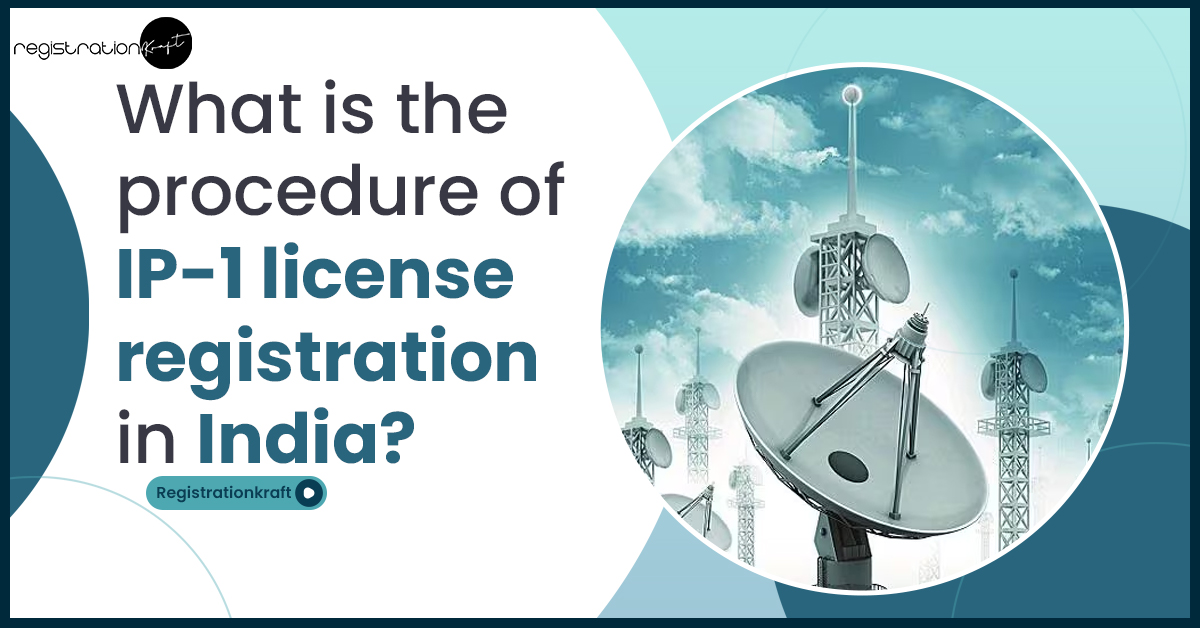Complete Guide to IP-1 License & Its Registration Process

IP-1 license refers to a kind of Telecom license that is issued by the Department of Telecommunications (DoT), which comes under the ruling of the Government of India. This IP-1 License allows companies to setup and manage passive telecommunications infrastructure like fiber cable networks, ducts,and towers. IP-1 License is mandatory for businesses that are looking to embark on the telecommunication sector. In this complete guide post, you will get to know everything about IP-1 license and its registration.
What is IP-1 license?
IP-1 license can be understood as a kind of authorization provided by the Department of Telecommunications (DoT) in India to businesses with a purpose to let them setup telecommunication systems infrastructure. In order to provide telecommunication services, businesses need to possess passive resources for infrastructure setup.
This license is awarded to those firms that have the capability to set up the telecommunications infrastructure in an effective and sustainable way. One crucial thing that is checked by the authorities is that the applicant has a solid plan to level up the service standards in the respective sector. Since this sector is directly proportional to the growth of the nation, this license holds immense importance in the domain.
What type of resources are provided by the infrastructure provider?
As it has been already mentioned, the telecommunication services provider would be allowed to get the passive resourced required for telecommunications infrastructure setup. These resources are defined below:
- Right of way – It refers to the allocation of specific bandwidth and other possessions to the ISP and telecom service providers
- Towers – Supply of towers to facilitate wireless communication
- Antennas – They enable broadcasting and reception of signals
- Internet Access – It is a kind of another infrastructure that is much needed for a business to run and sustain. It is an intrinsic element in any telecommunication service business.
- Duct Space – It refers to an open space that is used for the placement of wires for seamless telecommunication network. In the case of telecommunication, a network of fiber optic cables is setup in this duct space.
- Cloud Computing – It refers to the setup of remote server systems to deliver quick speed and resource savings.
The above mentioned resources are the most commonly used ones and they can only be obtained when the service provider has an IP-1 license.
One important thing to note that all these resource are passive and earlier IP-1 license was also required for the procurement of active resources. Amidst different types of IP Licenses, the major search was focused on the active resources. However, the Department of Telecommunications (DoT) has eliminated the need of IP-2 license. The reason behind this removal is to enable ease of business. IP-1 License registration refers to a kind of authorization that is needed by a business to become an Infrastructure provider and provide level 1 telecommunication services to various businesses. The Department of Telecommunication is the regulatory setup by the government to sanction this license.
By securing an IP-1 license, a business would be entitled to provide technological telecommunications infrastructure to telecom service providers with technological infrastructure. The infrastructure can be made up of resources mentioned above.
What is the scope of IP-1 license?
The biggest advantage that businesses can get by getting an IP-1 license is that they can set up a telecommunications infrastructure using these passive resources and secure a business opportunity by leasing the same to telecom service providers. This could pave way for a steady income source and growth over time.
In addition, IP-1 license holders can take the benefit coming out of different opportunities offered by the government like active participation in government contracts and tenders, get financial assistances, and several other perks.
Moreover, it would be easier for businesses with IP-1 license to validate their credibility and repute that is much needed to gain an edge in today’s competitive business landscape.
What is the eligibility criteria for IP-1 licence registration?
The most important thing to consider while securing an IP-1 license registration is to provide all the crucial documents that are required for the same. These documents are:
- Company’s PAN card
- Articles of Association
- Certificate of Business Incorporation
- Memorandum of Association
- KYC of the associated directors
- List of all the directors and shareholders
- A demand draft of Rs. 5000/-
Procedure of IP-1 license registration in India
Registering for IP-1 license is very easy and quick if you have all the documents mentioned above. Over time, the respective authority has made if really seamless for applicants to secure IP-1 license. Let’s look at the step-wise procedure of IP-1 license registration below.
Step 1: Check your eligibility to obtain the IP-1 License
It is not possible for a business to get an IP1 License if it is a proprietorship or a partnership business. The application should only be made by a registered business entity setup under the Companies Act 2013. So, the first thing to do is to setup a business entity by registering your business.
Step 2: Fill out the form and provide the documents required
- Visit the website of DoT at www.dot.gov.in.
- Click on the “Licenses” tab on the main menu.
- Now select “Infrastructure Providers (IP)”.
- Check the “IP Category-I Registration” option.
- Read the guidelines before filling out the application form.
- Upload all the required documents.
- Pay the application charges
Step 3: Submit the application
It is recommended to seek the services of domain experts to file the application via the IP1 license application form at the nearest branch of the Department of Telecommunication. Never miss to affix the receipt of the IP-1 registration fee alongside that application.
Step 4: Processing of application
The acceptance of your application form won’t take much time but yes, its processing may be prolonged. Typically, it gets processed within 60-90 days.
Step 5: Receive the DOT IP1 License
If you have followed the right application procedure and furnished all the required documents, once your application gets approved, obtain the IP-1 license.
Post-Incorporation Compliances for IP-1 Licensee
- The DoT has put in place no restriction on the applicant company’s Foreign Equity level.
- The applicant should submit the application for registration in the prescribed format.
- The applicant company must carry the Right of Way (ROW).
- Change in the name of the applicant company or the licensed IP-I can be allowed in terms of the Companies Act, 1956.
- The applicant company must be informed of the approval or rejection of the application within 15 days of submission.
- The registration for the IP-I License must be on a non-exclusive basis without any restriction on the number of entrants.
- The IP-I registered company must provide dark fibers, Right of Way, duct space, and towers on a lease, rent out, or sales basis to the license holders on mutually decided terms and conditions.
- The IP-I registered company must need to furnish a copy of an agreement with the other service providers or IP-II within 15 days of signing such agreement.
- The IP-I licensed company must ensure the utilization of telecommunications infrastructure in a non-discriminatory manner.
- The applicant company must pay an IP1 license processing fee of Rs. 5,000/- in the form of a Demand Draft or Pay Order payable at New Delhi in the name of the Pay & Accounts Officer (Headquarters) DoT.
- The application must be submitted to the Section Officer, CS-III, Department of Telecommunications, Room No. 713, Sanchar Bhavan, 20-Ashok Road, New Delhi-110 001.

The Conclusion
If you look forward to establishing a telecommunications business with a purpose to grab the prevailing growth and business opportunities in telecom sector, it is necessary to get an IP-1 license. Having such a license would enable you to secure passive resources needed for the setup of a telecommunications infrastructure. You can lease out the same to other businesses to generate a steady source of income.
Connect with Registrationwala for consultation.
Categories: Business
Tags: IP1 license, Telecom, telecom license





